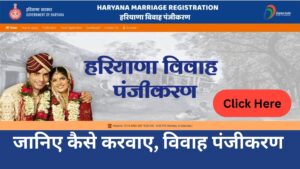| Title: | What is Special Marriage Registration |
|---|---|
| Description: | What is Special Marriage Registration? Special Marriage Registration refers to the legal process under the Special Marriage Act, 1954 in India, which allows individuals of different religions, castes, or nationalities to marry without needing a religious ceremony. The Act provides a secular framework for marriage, unlike religious personal laws (like Hindu Marriage Act or Muslim Marriage Law).  Here’s an overview of the Special Marriage Registration process: Key Features of Special Marriage Registration: Interfaith or Inter-caste Marriages: It enables people of different faiths, castes, or nationalities to marry. Civil Marriage: The marriage is solemnized by a Marriage Officer (usually the Registrar of Marriages), without any religious rituals or customs. Age Criteria for Special Marriage Registration:
Notice of Intended Marriage under Special Marriage Registration:
No Religious Conversion Required: There is no requirement for either party to convert to the religion of the other. Objections: If any objection is raised during the 30-day period, the Registrar will investigate it. If no valid objection is found, the marriage will proceed. Marriage Solemnization: After the notice period, the couple, along with three witnesses, must appear before the Registrar for the solemnization of the marriage. Marriage Certificate: Once the marriage is registered, a marriage certificate is issued, which is proof of the legal union. Documents Required for Marriage Registration under Special Marriage Act:
The Special Marriage Act is especially significant for couples who face societal or family pressure due to their differing religious or cultural backgrounds, as it ensures their right to a lawful union. To register a marriage under the Special Marriage Act, 1954, follow these steps: Steps for Registration Under the Special Marriage Act: Filing a Notice of Intended Marriage under Special Marriage Act:
Public Notice and Objection Period under Special Marriage Act::
Resolution of Objections under Special Marriage Act::
Solemnization of Marriage under Special Marriage Act::
Marriage Certificate under Special Marriage Act:
Documents Required for Special Marriage Registration: Notice of Intended Marriage (form as prescribed by the Registrar) Proof of Age under Special Marriage Act::
Proof of Residence under Special Marriage Act::
Affidavit stating the marital status (single, divorced, or widowed), nationality, and intent to marry. Passport-sized Photographs of both individuals. Death certificate or divorce decree, if applicable (for widowed or divorced individuals). Proof of Divorce in case either party was previously married. Conditions for Marriage Under the Special Marriage Act:
Conclusion: Registering a marriage under the Special Marriage Act ensures that the marriage is valid and recognized legally, without requiring adherence to religious ceremonies. After the successful completion of all steps, the marriage certificate issued by the Registrar serves as legal proof of the marriage. |
